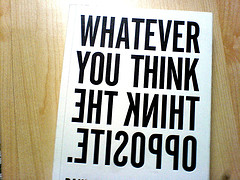There are so many fallacies and biases that I can’t keep them straight, even though critical thinking is something I value highly. I’m not much good at debate, and although I’d love nothing more than to engender critical thinking and skepticism in others, I don’t have any good ideas on how to do that, except maybe hitting them with a WWIT? question.
But what about aspiring skeptics– people who already have the spark of reason but haven’t yet learned to see the fnords on their own?
You can’t just toss formal logic at them and say “here, you’re good to go”. There ought to be some kind of primer or baseline; some few principles to learn, understand, and then apply. I read a thoughtful post entitled Obstacles to Critical Thinking, and realized that the items discussed therein would be a great place to start.
- When I have an emotional stake in something, I am extremely likely to be affected by selective validation.
- Don’t give authority a free pass from skeptical scrutiny, especially when I like or tend to agree with the source.
- Just because something is normal, conventional, or popular doesn’t make it true or correct.
- My memory is not as accurate or complete as it seems, and neither is anyone else’s.
- My mind is heavily optimized to use and trust cognitive biases, so thinking critically will always be a challenge. Don’t get cocky!
In fact, running these checks on a regular basis is probably a good idea no matter what your level of skeptical skill.

55 responses to “A critical baseline”
cheap avodart cheap in uk
get avodart cheap online no prescription
flexeril cyclobenzaprine ups
get flexeril cyclobenzaprine australia price
ordering gabapentin for sale usa
gabapentin australia cost
online order itraconazole uk generic
how to order itraconazole canada internet
sans ordonnance kamagra bon marche prix
kamagra livraison de livraison le lendemain